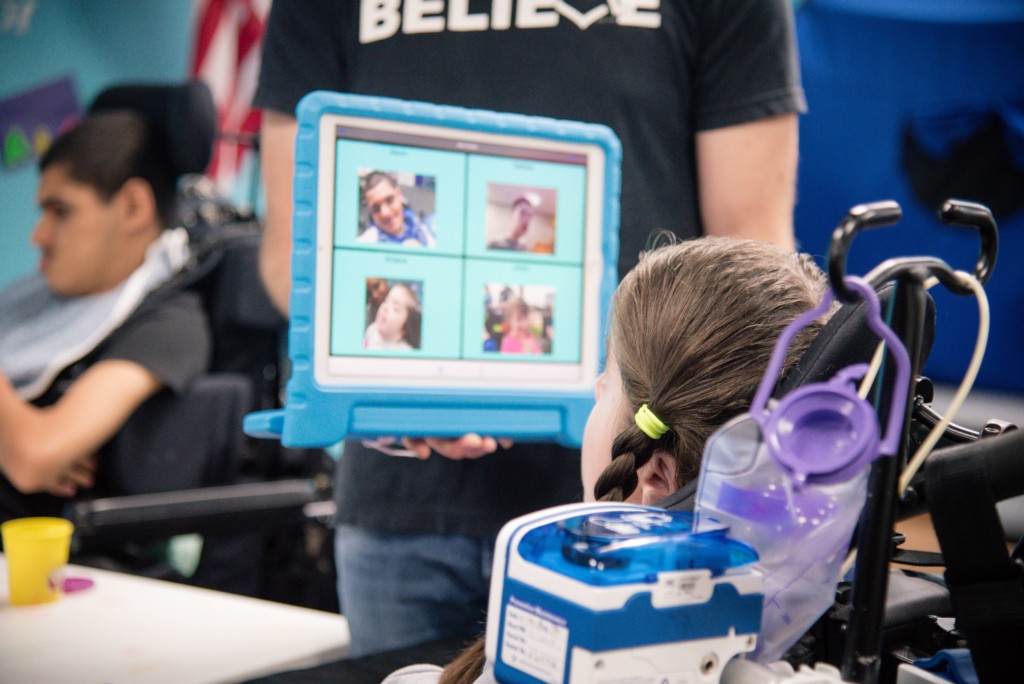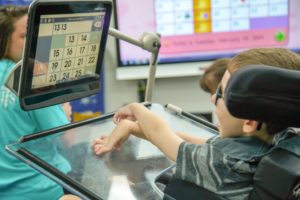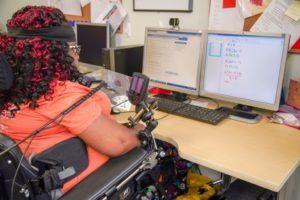
No Limits Academy in Melbourne welcomed 30 of its 44 students back to in-person learning last week. All No Limits students receive state scholarships, including about 70% who participate in the Gardiner Scholarship program.
After COVID-19 forced schools to shutter in March, many parents of students with special needs worried the shift to distance learning had shortchanged their children and caused them to lose ground.
The Centers for Disease Control and Prevention echoed those concerns in its recommendation for a return to in-person education. The American Academy of Pediatrics stressed the need for children with disabilities to have access to services that were challenging to deliver online. And in late July, Florida Gov. Ron DeSantis held a roundtable at a school for special needs in Clearwater where parents expressed a desire for their children to return to brick-and-mortar education.
As school re-opening drew closer, parents continued to wrestle with the decision to send their special needs children back to school and risk their health or keep them home and risk academic regression.

No Limits Academy is maintaining its focus on academics for its students with unique abilities.
“Most of these kids were left behind,” said Laura Joslin, founder and CEO of No Limits Academy in Melbourne. The private, nonprofit school, located on Florida’s Space Coast, opened in 2008 and specializes in special education for students with unique abilities.
Joslin, the mother of two sons who have cerebral palsy, said she opened No Limits because district schools were unable to meet her sons’ needs. She also operates a rehabilitation center that provides onsite therapies for special needs students.
This year, Joslin offered her families a choice: Return to campus or learn at home using her specially developed virtual program. Most families chose in-person learning. Joslin and her team welcomed 30 of No Limit’s 44 students back to campus when school reopened last week.
All No Limits students receive state scholarships, including about 70% who participate in the Gardiner Scholarship program administered by Step Up For Students, which hosts this blog.
Students eager to return greeted their teachers with smiles. “They were really excited to be at school,” Joslin said. “Life looks normal again.”

No Limits Academy is adhering to social distancing despite the challenge of making room for wheelchairs.
Not that the re-opening didn’t require major changes to promote safety. Teachers and staff are required to wear masks. Teacher, staff and student temperatures are taken upon entry to the building and throughout the day. No parents or visitors are allowed inside the building.
It’s not possible to require that students wear masks, Joslin explained, because many have respiratory difficulties or medical conditions. But other safety measures are in place.
Classes are self-contained with students staying with the same teachers and aides all day. There is a lot of handwashing and cleaning with medical-grade wipes. Students are socially distanced between each other as much as possible.
That presents a special challenge, Joslin said. “Wheelchairs take up a lot of space.”
There are other challenges. Many No Limits students need help with their most basic needs such as feeding, toileting and in some cases, diapering.
“I told the health department that if I have a child who needs to be changed, that’s not going to be 6 feet of distance,” Joslin said. “I’m trying to do the best I can with situation that I have.”
Despite the extra care required, Joslin stressed that education remains the primary focus at No Limits Academy.
The school maintains a routine that allows plenty of time for lessons. Students who are non-verbal communicate through devices attached to their wheelchairs. Students with vision challenges stay close to oversized message boards.
There are no grade levels at No Limits, only cognitive levels, and students advance as they master skills. They all have individualized education plans that specify their educational goals and necessary accommodations. Achievements, no matter how small, are celebrated.
“There’s no babysitting going on,” Joslin said. “What I want is brain stimulation.”
Although many parents insist on face-to-face education for their special needs children, Joslin says her virtual program is an equally valid choice. After translating her curriculum to an online platform in the spring to make a smooth transition for her families, schools in New York and New Jersey started contacting her for guidance.

Gavin McEver, 8, a student at No Limits Academy.
Tonya McEver said her 8-year-old son, Gavin, who has a chronic lung condition and cerebral palsy, is doing well with No Limit’s virtual program.
“I’ve heard about kids with special needs getting left behind,” she said. “That’s not happening here.”
Just two days into the new school year, McEver said, Gavin already had experienced a math, reading and vocabulary lesson, attending two sessions of classes in the mornings and one-on-one teacher sessions in the afternoons.
“We are blessed to be able to keep him home right now,” McEver said of Gavin, who spent six months in a neonatal unit after being born four months premature and weighing less than 2 pounds.
McEver turned to No Limits after Gavin came home from his previous school with bruises on his legs. The staff had restrained him in his wheelchair because he liked to be active while he learned.
She’s thrilled with the progress Gavin has made in just two years at No Limits.
“We see him engaging more in curriculum,” McEver said, adding that he has started communicating thorough a tablet.
“He was able to tell his teacher that his stomach hurt, and could he call his mom,” she said. “I was crying all the way to pick him up.”
This time around, they were tears of joy.